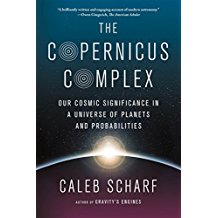The Copernicus Complex: Our Cosmic Significance in a Universe of Planets and Probabilities, Caleb Scharf, 2014
An important and challenging book that attempts to address the question posed in the subtitle traveling the broad territory between the Copernican mediocrity (a huge shift in the view of the world dating from the mid-1500’s that established the heliocentric view of the solar system and led to the concept that we’re not special and only one of millions of life sustaining worlds) and the anthropic principle (we are the unique result of a solar system and universe that resulted in us so that we could be here to observe and understand it). The author, perhaps predictably, ends up in the middle ground summarizing (spoiler alert!) his view of our cosmic/chaotic condition with the phrase that we are special but not significant, unique but not exceptional. In other words, we’re pretty unusual but it’s likely that life in some form is out there. He concludes with the sobering but very real observation that we had better figure out where else life exists since it’s only be sending some robot or other message carrier there that we will leave some fossilized fingerprint that we existed on this small orb at some time in the universe’s 13.8 billion year history. There is a huge amount of information, facts, statistics, data and scientific philosophy in this 238 page book, but the most compelling idea was the concept that we, ie the human species, exist at a moment in time and at a place in space that are totally contingent. The universe at 13.8 billion years old and expanding ever more rapidly due to dark energy (70% of all the matter and energy) has spawned a trillion billion stars and is more than 2.7 x 10 to the 23rd power in all directions and here we are, at a moment when we can actually quantitate gravity, electromagnetic force, etc and develop theories about our origins and whether life exists elsewhere. Alter things a bit and we would have arrived too early to evolve (no oxygen for earth’s first billion years) or too late to see the stars as they race away from our Milky Way galaxy. Change the incorporation of mitochondria into bacteria or archaea and eukaryotes would not have been possible and we could not have evolved brains, language, etc. It’s all totally contingent and existing at the edge of cosmos and chaos. The universal chemistry and physics of the building blocks of life argue for the Copernican mediocrity theory. The contingent circumstances of our presence argue for the anthropic principle. Scharf wants it both ways and argues that only through further science and facts can we resolve the issue. Good though very challenging book.



